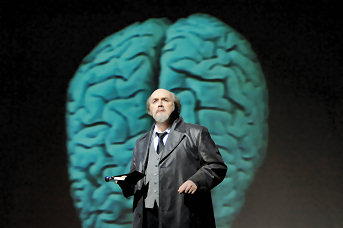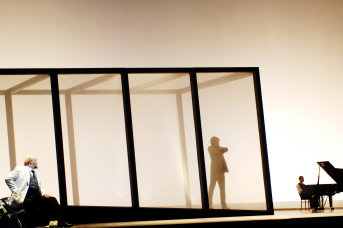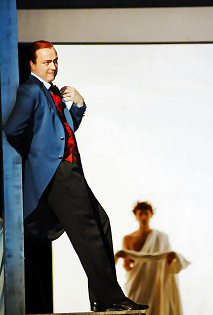|
|
| 
Editor:
Marc Bridle
Regional Editor:Bill Kenny
Webmaster:
Len Mullenger

|
Seen and Heard International
Opera Review
Britten,
Death in Venice soloists, orchestra and chorus
of Frankfurt Opera. Conductor: Karen Kamensek. Director:
Keith Warner. Sets: Boris Kudlicka. Costumes: Kaspar
Glarner. Premiere on 25.2.2006. (SM)
Aschenbach: Kim Begley
Traveller, Elderly Fop, Gondolier, Hotel Manager, Hotel
Barber, Dionysus: Johannes Martin Kränzle
Tadzio: Laurenz Johannis Leky
Apollo: William Towers

Britten's final opera, "Death
in Venice", is so rarely staged that it seems more
than lucky coincidence that as many as three new productions
are being put on within the space of just four months
in Germany this year. Keith Warner is responsible for
the first-ever staging of the work in Frankfurt, which
opened on Saturday. The tiny houses of Greifswald and
Stralsund will unveil Ralf Dörnen's new production
next month and then in May, Andreas Baesler presents
his reading of this morbid 12-tone work, which is effectively
Britten's own requiem for himself, at the theatres of
Krefeld and Möenchengladbach.
As ever with Britten's oeuvre, the composer's own landmark
recording of "Death in Venice" - he was too
ill at that stage to conduct himself, but he closely
supervised the recording with Stuart Bedford - is both
a bane and a blessing. Blessing because like all his
other own recordings, it not only offers invaluable
insights into Britten's own intentions, but also stands
as the definitive, still unsurpassed performance of
the work. But a bane too, because any subsequent performance
of the role of Gustav von Aschenbach will inevitably
be compared - unfavourably - to that of the role's creator,
the composer's lover and lifelong companion, Peter Pears.

While the themes of Britten's other masterpieces
for the stage, "Peter Grimes", "Turn
of the Screw" or "Billy Budd" are much
more universal, one of the difficulties in staging
"Death in Venice" surely lies in the fact
that its setting is so precise, both in time and location
and in its protrayal of attitudes towards homosexuality
that have long become outdated, even since the early
1970s when Britten composed the work.
Given the specificity of the opera's themes, it was
either courageous or foolhardy of Keith Warner and
his set designer Boris Kudlicka to cut all references
to time and place to an absolute minimum. Venice is
only hinted at by its labyrinth of canals, which is
likened to the topography of the human brain at the
start of Aschenbach's monologue, and by the sinister
death-black gondolas that glide across the stage,
at one point bearing Aschenbach's own coffin, as if
in some oblique reference to Nicholas Roeg's seminal
thriller, "Don't Look Now", which coincidentally
was also made in 1973.
It is only at the very end in one of the strongest
images of the entire evening that we see the spires
and domes of Venice, inverted, descend from the sky
and envelop the dying Aschenbach. Perhaps this refusal
by Warner to offer a concrete staging, to revisit
the visual opulence of Luchino Visconti's film of
the same year, is a commendable attempt to make the
opera's themes more universal.
But any such intentions are ultimately undermined
by the cliche-ridden portrayal of Aschenbach's love
for Tadzio, which Warner degrades to nothing more
than the lustful longings of an ageing, dirty old
queen for a quick glimpse of the boy with no clothes
on, a sort of death-dance à "La Cage aux
Folles". And without the specificity of time
and place, Kudlicka's austere, but constantly shifting
sets of floating frames and gliding gondolas -or all
their picture-postcard beauty - appear more an attempt
to hold the audience's attention rather than offer
any really new perspectives on the work.

Another of the most visually arresting
scenes was also one of the simplest - when Aschenbach
spies Tadzio as he strolls along the endless beach
of the Lido in the bright morning light.
Musically, the success of this two-and-a-half-hour-long
work depends solely on the role of Aschenbach, who
is on stage for the entire evening. And in Kim Begley,
Frankfurt has found a tenor with a rare beauty of
tone. Begley wobbled a little in the opening scene
("My mind beats on"), but the lyricism of
his voice soon shone through, tinged with just the
right touch of melancholy. Nevertheless, Begley came
nowhere near the dramatic intensity of Pears - or
more recently of Philip Langridge on Richard Hickox's
new recording - in the role. Here was no ageing artist
in spiritual crisis, but a likeable, rather podgy
civil servant of a man constantly scribbling notes
into his writer's notebook.
Frankfurt's own Johannes Martin Kränzle was also
no match for John Shirley-Quirk for whom Britten wrote
the multiple Mephisto-like roles of Traveller, Elderly
Fop, Gondolier, Hotel Manager, Barber and Dionysus.
Indeed, Kränzle's baritone tends to thin out
and wobble in his top register. And while he was very
well suited to the Wozzeck-like satire of the hotel
barber, he lacked the brooding malevolence that should
have made the Gondolier really creepy.
Countertenor William Towers, making his Frankfurt
debut, sang Apollo with beacon-like beauty. Instead
of the young male dancer that Britten had in mind
for Tadzio, Warner uses an actor, Laurenz Johannis
Leky, who is a little too knowing as the sultry, arrogant
object of Aschenbach's desires.
In the pit, Karen Kamensek conducted Britten's amazing
score, which ranges from dodecaphony to shimmering
gamelan music, with superb discipline and security.
And the Museumsorchester was every inch up to the
work's virtuosic demands.
It is wonderful to see "Death in Venice"
staged and this new Frankfurt production is tasteful
and pleasing on both eye and ear. But there were plenty
of dramatic longueurs during the course of the evening
and Warner's reading ultimately failed to make any
real lasting impression.
Simon Morgan
Pictures ©
Monika Rittershaus 2006
Back to the Top
Back to the Index Page
|
|





